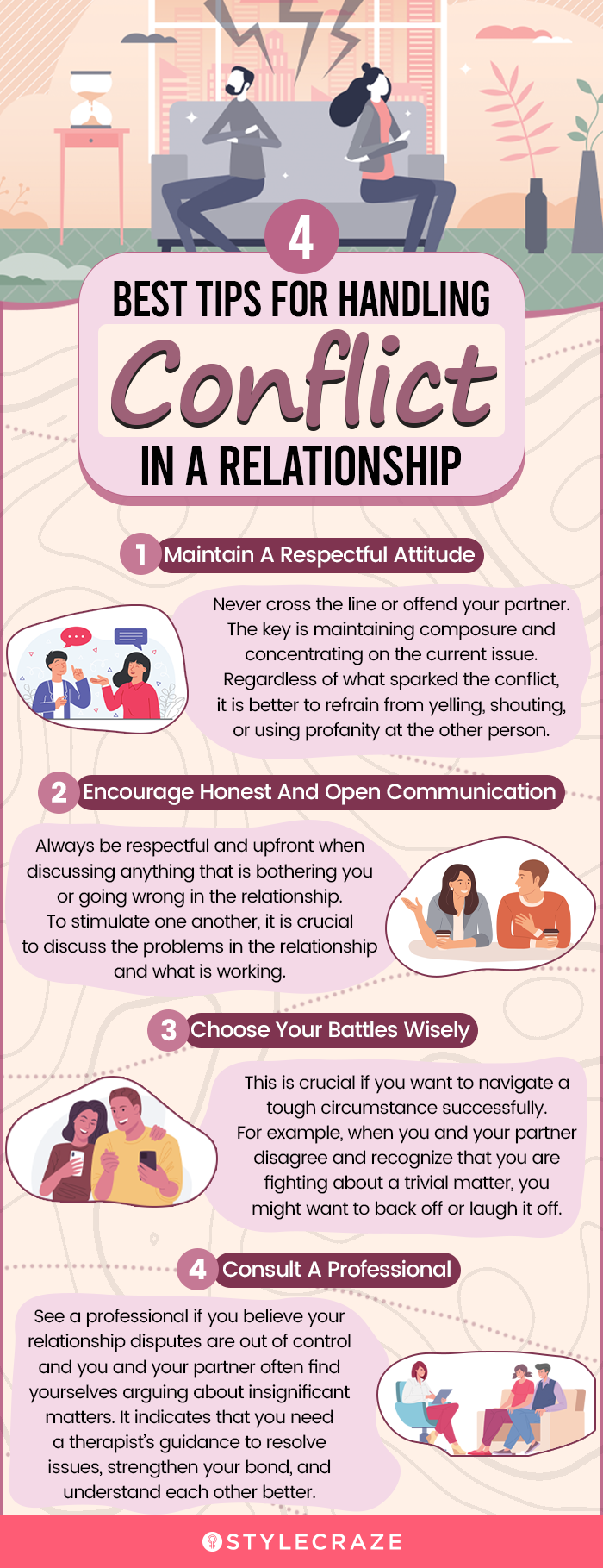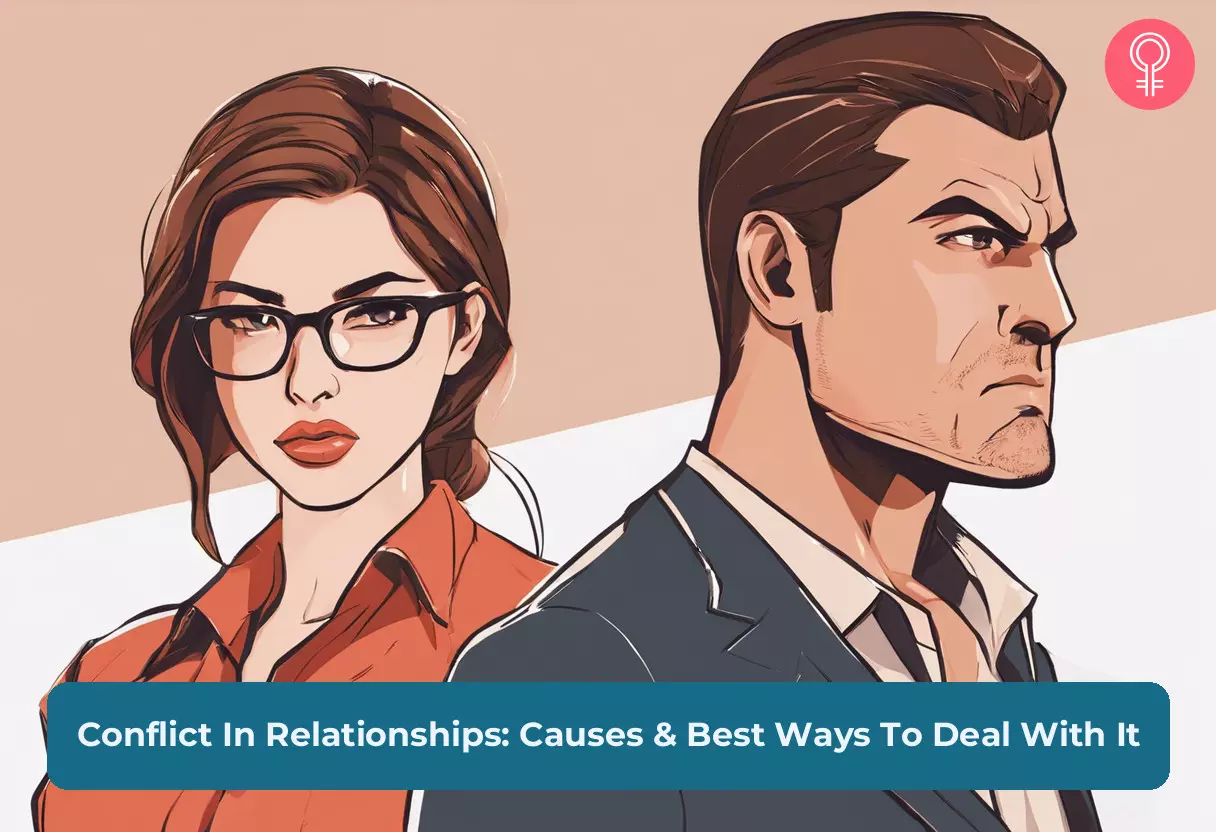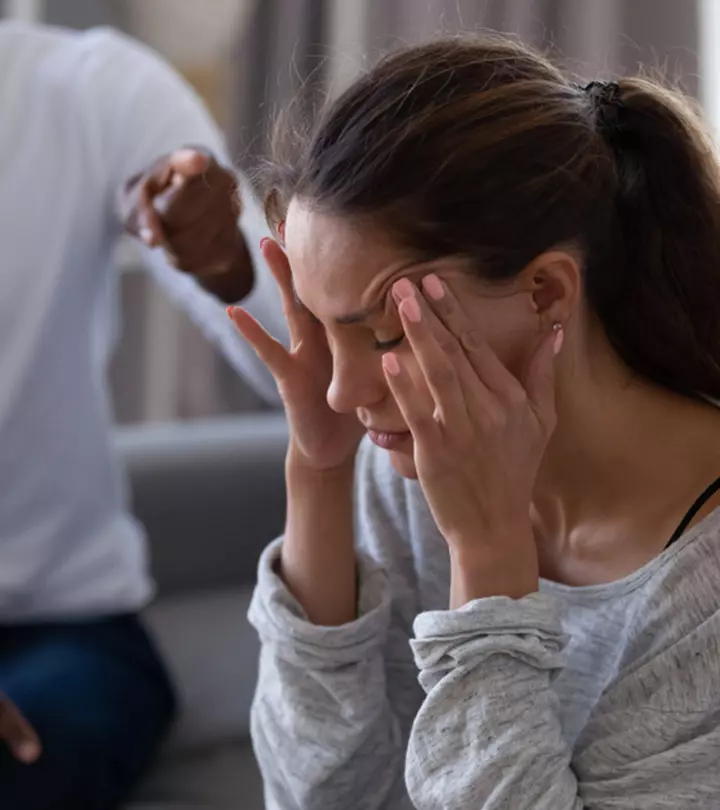Conflict In Relationships: Causes & Best Ways To Deal With It
Simple tips to help you navigate and deal with conflicts in a relationship healthily

Image: Shutterstock
Relationships are nothing but two different personalities with varying viewpoints coming together. So, conflicts in relationships are bound to happen when they are not accommodative and fail to understand each other’s feelings and differences.
But what could be the root cause of these conflicts? Well, it could be the differences in perspectives, beliefs, opinions, personalities, experiences, and tastes.
This article explores the types of conflicts a relationship may encounter, what causes them, their consequences, and the best ways to deal with them peacefully. Keep reading.
In This Article
Understanding Conflicts In Relationships
A conflict in a relationship is defined as any kind of disagreement, struggle, or a heated debate between two people in a relationship.
It typically includes an argument or continuous disagreements on an ongoing issue – like managing household chores or the ways of spending money.
Conflicts in a relationship can be very stressful, but they can also help make relationships strong. Essentially, conflicts between people make them aware of the problems in their relationships and how they can address them effectively.
It is essential to know the causes of conflicts to deal with them healthily. We have discussed the same in the next section.
Key Takeaways
- Any disagreement and difference of opinion between two different personalities may cause conflicts in relationships.
- They can lead to stress, anxiety, and depression in both partners.
- But you can deal with conflicts in relationships by creating a healthy environment, staying calm, and seeking professional help.
Main Causes Of Conflicts In Relationships
Partners can have disagreements for various reasons. One of the most common causes of relationship conflicts is a complete difference in personalities and values. Following are a few other causes:
1. Power And Control

Wanting to have control and power over people is one of the main causes of relationship conflicts. This generally happens when one person enjoys feeling superior to another.
The solution, however, is to try putting yourself in your partner’s shoes instead of trying to control them and indulge in power struggles. What couples need to remember here is that intimidation drives out any intimacy in the relationship, while empathy and respect for each other encourage it.
2. Selfishness
We often get so obsessed with our desires that we forget how our decisions affect others. This is true for any kind of relationship. In relationships, couples often have conflicts when one partner fails to think of the other person when making decisions.
Being selfish and unable to respect the needs of the other person can make a healthy relationship impossible.
3. Criticism
A relationship where your partner criticizes everything you do is plain annoying. It can be equally frustrating if your partner blames you for everything. This is a sign of major trouble in the relationship.
4. Lack Of Communication

Communication is one of the most important qualities of a healthy relationship. However, communicating in an unhealthy relationship can result in arguments and constant bickering. This can lead to tension and, as a result, an end to any further communication in the relationship.
Contrary to this, communicating the wrong way in the relationship can also cause conflicts.
5. High Expectations
When one partner fails to meet the other’s expectations in a relationship, the latter tends to feel betrayed and hurt.
To navigate the situation effectively, both partners need to keep their demands and expectations reasonable. They must always communicate with their partners to ensure they are on the same page.
6. Resentment
If one partner offends the other for some reason, the other individual often fails to communicate the pain they felt. The latter is likely to keep those negative emotions in their mind and heart, leading to resentment.
What is needed here is to evaluate the root cause of the resentment. At times, the partner will seem upset but will not tell why. They also become distant, causing the other individual to think that they are not interested in the relationship.
These are the causes of relationship conflicts and arguments. Let us understand the different types of these conflicts.
Various Types Of Relationship Conflicts
1. Finances

Relationship conflicts revolving around money are common. These can be anything from how you save, spend, or budget money as a couple.
2. Household Responsibilities
This conflict is associated with the delegation or distribution of household chores. It happens when one partner contributes more towards taking care of basic household chores and responsibilities than the other. This can breed resentment and lead to conflicts. When partners fail to contribute to each other lives through domestic roles and responsibilities, this could signal domestic incompatibility.
3. Improper Communication
Conflicts around communication can happen when both partners yell at each other and get into heated arguments.
4. Personal Intimacy
This type of conflict revolves around sexual needs/desires. It is often caused when one partner’s sexual needs/desires greatly vary from those of the other. The conflict can further escalate if infidelity is involved.
5. Insecurity
When one of the partners in the relationship constantly feels insecure, this can cause arguments, bickering, and conflicts. In extreme cases of insecurity, it can also lead to all kinds of accusations that make any conversation difficult.
Are you wondering what effects such conflicts can have on relationships? Read the next section to find out.
Effects Of Conflicts And Stress On Relationships
Conflict in relationships can lead to a significant amount of stress and emotional turmoil between the partners. The ongoing stress can negatively affect the health and well-being of both partners. It can also lead to anxiety, depression, and a drop in sleep quality.
Other effects of relationship conflicts can include:
- Unhappiness and less satisfaction with the relationship
- Emotional and physical withdrawal from everything
- Lack of interest to work on conflict resolution strategies
- Various types of insecurities
- Harmful physical behavior, in extreme cases, like violence
Conflict triggers some very strong emotions that can lead to disappointment, feelings of hurt, and discomfort. When handled in an unhealthy manner, they can lead to irreparable rifts and breakups.
How can someone deal with conflicts healthily? Let us explore in the next section.
Ways To Deal With Conflict In Relationships
Disagreements in a relationship are common. But what matters is how you choose to deal with them. The way you tackle an issue with your partner can determine how healthy or unhealthy your relationship is. Here are some tips to help you healthily handle your next argument when experiencing a communication breakdown.
1. Maintain A Calm And Respectful Demeanor
When facing a relationship conflict, make sure to not cross lines or start insulting your partner. Instead, the need is to stay calm and focus on the dispute or issue at hand.
Bringing personal jibes into an argument can make things worse. Irrespective of what caused the issue, it is best to stay away from yelling, shouting, or cursing at the other person. The focus of your conversation should revolve around solving any existing misunderstandings by knowing how both of you feel about a certain thing that can be totally different from what you could have expected. So, try to stay calm and approachable.
 Quick Tip
Quick TipYou can use humor to diffuse the tension. Talking with an accent or imitating a personality while talking can make your partner laugh and deal with the situation in a calm and light way.
2. Create A Welcoming Environment For Open And Transparent Communication
The sign of a healthy relationship is when you and your partner can respectfully communicate openly about what is wrong in the relationship, what is bothering you, or what is going well. Nathalie Maggio, LMFT, says “Conflict in relationships is normal, it’s how we handle it that matters. By using active listening and taking the time to truly understand one another, we can use conflict as an opportunity to grow closer and strengthen our relationship. Remember to listen actively, summarize, and check with your partner if you understood them correctly. Then switch roles. From there you can work on finding a compromise if needed.”
It is essential to talk about the issues in the relationship and what is going right to motivate each other. Karen Strang Allen, a blogger, shares her experience of re-entering the dating scene after 12 years and trying to navigate through it by being more open. She writes, “I have judged previous partners when my needs were not met, thinking they were intentionally holding out on me. I understand now that our needs were simply different, our personalities incompatible (i).” Her approach to conflicts is based on what she and her partner are willing to do to resolve the problem and grow closer as a couple. She continues, “With this new and better method of conflict resolution, I feel equipped to make better choices and put my relationships first.”
If, at any point, you feel like you cannot talk openly about certain aspects like kids, money, or aspirations, it could be a sign your relationship is not healthy.
 Quick Tip
Quick TipPick a time and place to discuss your issue. Start with the end goal in mind and each partner should generate ten solutions to the problem. Analyze each option and choose how to implement the solution you finally select.
3. Find Some Middle-Ground

One of the best ways to deal with a conflict in a relationship is finding a middle ground. It is important to strike a balance between what both partners want and are comfortable with.
If both partners care about making the relationship work, they need to agree on various issues without feeling like they are sacrificing for the relationship to work.
Learning to compromise is one of the best ways to resolve a conflict in a relationship, and it might be easier than you think. For instance, if you constantly disagree on money matters, it is best to control the finances alternatively and see who manages them better at the end. Or, if you feel your partner is not contributing to household work, allocate tasks and ask them to help out.
4. Pick Your Battles Wisely
To navigate a tense situation effectively, make sure to pick your battles wisely. If you realize in the middle of an argument or disagreement that you and your partner are fighting over something minor, consider backing down or just laughing it off. For instance, fighting or arguing about which TV show to watch is not something you should waste your time and energy on.
5. Be Direct In Your Approach
Make sure to be direct and state what is bothering you instead of choosing indirect ways to express your unhappiness or displeasure. Beating around the bush without directly approaching the problem or being evasive can make the situation worse.
Indirect ways of expressing your anger are not constructive as they do not give the person a clear idea of how to respond to the situation. While they know that their partner is irritated and distressed over something, the lack of directness in communication leaves them without any clue or guidance about what went wrong or what they can do to solve the issue at hand.
6. Talk To Professionals

If at any point you feel that your relationship conflicts are getting out of hand or your partner is dealing with trust issues and bouts of uncontrolled jealousy, seek professional help. If you and your partner cannot stop fighting over trivial issues, it probably is a sign that you need expert intervention to help improve your relationship and understand each other better.
Couples therapy offers a safe space to navigate conflicts and strengthen relationships. In these sessions, therapists might ask both partners about their perspectives on the issues. They might delve into each person’s feelings, behaviors, and communication styles to understand the root of the problems.
Your therapist may ask you to participate in activities to improve listening skills, communication techniques, or even role-playing to better understand each other’s viewpoints. Remember, therapy aims to create a supportive environment where both partners feel heard and understood. This may help improve communication, understand the needs of your partner better, learn conflict resolution strategies, and rebuild trust in your relationship.
Infographic: 4 Best Tips For Handling Conflict In A Relationship
Conflict in a relationship is common and, if we handle it well, it can make us feel more connected to and understood by our spouse. However, unhealthy conflict can cause disconnection, dissatisfaction, and distancing. If conflicts are causing strife in your relationship, it’s time to rethink how you and your partner handle disputes by incorporating more optimism into your daily interactions and having conflict-resolution conversations. The best tips for handling conflict in your relationship are provided in the infographic below. Take a look!

Illustration: StyleCraze Design Team
Conflicts in relationships could arise for several reasons and are fairly natural between couples. People are different, and they cannot be expected to agree on everything with each other. The best way to deal with it is to resolve it in healthy ways with your partner instead of skirting around the issue, which could explode unexpectedly.
This article tells you all about conflict in relationships and gives you tips to deal with them. You may try them to see if they work in helping you and your partner handle your conflicts healthily and constructively.
Frequently Asked Questions
Do conflicts make a relationship stronger?
Yes, conflicts can provide an excellent opportunity for strengthening a relationship. Conflicts welcome the partners in the relationship to assess the need for change, look at each other’s perspectives clearly and develop trust in the relationship as they come out the other side of disagreements without injuring the relationship or each other.
How do you fix a relationship after a conflict?
After a major conflict that has shaken the relationship, the first thing to do is give each other space and time to reflect. When you establish communication again, discussing the issues that arose while taking responsibility for individual thoughts, actions, and feelings, and being an active listener is essential. Apologizing for overstepped boundaries or injuries can go a long way in helping mend the bridges.
How do you avoid conflict?
State your views respectfully and calmly or postpone the conversation if you need more time to think things through. Once you are ready, talk to the person and describe the situation, and listen to the other person’s problems to come up with a solution together.
Is conflict good or bad in marriage?
Conflicts are good and necessary in marriage as long as they are managed and resolved healthily and maturely.
How can I forgive my partner after a conflict in a relationship?
Talk openly about what happened, clearly state your feelings and emotions to your partner, and tell them how their words and actions have affected you. Once you are done stating your points, listen to their thoughts and understand the situation from their view, lay down new parameters, and slowly let it go as conflicts are a normal part of every relationship. If you have a hard time forgiving your partner, speak to a therapist to help you resolve your issues.
What are some common mistakes that people make during conflicts in relationships?
Being defensive, not listening to their partner’s problems, playing the blame game, always wanting to be right to win the argument, and not apologizing for their mistakes are some of the common mistakes that couples make during conflicts in their relationships.
Illustration: Conflict In Relationships: Causes & Best Ways To Deal With It

Image: Stable Diffusion/StyleCraze Design Team
Check out this video to learn how to resolve conflicts in relationships. Get tips on how to communicate effectively and find a resolution that works for both of you.
Personal Experience: Source
StyleCraze's articles are interwoven with authentic personal narratives that provide depth and resonance to our content. Below are the sources of the personal accounts referenced in this article.
i. Loving and Leaving: Beginning and Ending Relationshipshttps://silverliningsblog.wordpress.com/2011/09/04/loving-and-leaving/
Read full bio of Nathalie Maggio
Read full bio of Sneha Tete
Read full bio of Shatabdi Bhattacharya
Read full bio of Gazala Firdos Ansari


























Community Experiences
Join the conversation and become a part of our empowering community! Share your stories, experiences, and insights to connect with other beauty, lifestyle, and health enthusiasts.